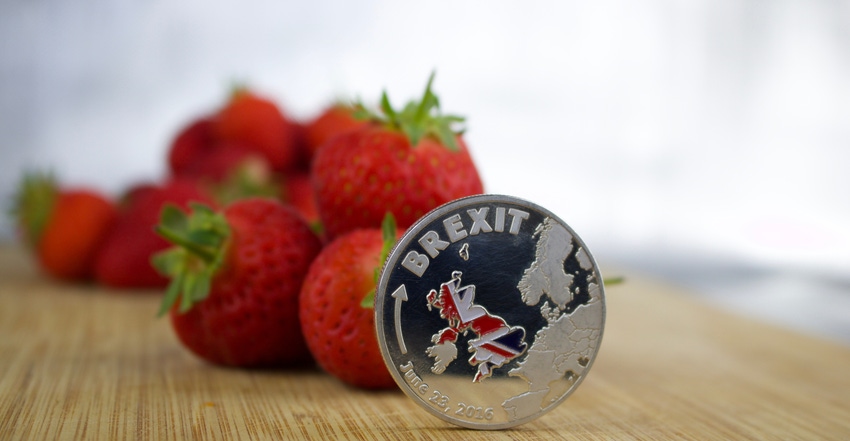The U.K.’s departure from the EU sparks uncertainty in future trade agreements with the United States, which may not be finalized until after Brexit occurs.

“Brexit” is a term widely used by many, both in the United States and globally; yet not many within the U.S. food and dietary supplement industry give much thought about what it is and how it will affect U.S. product export/import. This could likely be a moot question for many, particularly those companies that do not export/import supplement product from/into the U.K.
Brexit is an abbreviated term that simply means “British exit” from the European Union (EU), a group of 28 European countries allied through joint economic and political coalition (27 when the U.K. leaves). The term itself is claimed to have been coined in 2012 by Peter Wilding, a former media chief for the Conservative party in the European Parliament, a pro-EU lecturer, blogger and attorney in EU Law, and founder and chairman of British Influence, a consulting firm focused on the EU single market and EU-U.K. negotiations. (Note: Some argue the term Brexit was not created by Wilding, but most writings show him as the primary initiator, and the Oxford English Dictionary officially recognized him as having coined the term.
After 44 years as a member of the EU, British subjects of voting age, in a June 23, 2016 referendum, voted 51.9% to 48.1% to leave the EU. The voter turnout was approximately 72%, with more than 30 million people voting. On March 29, 2017, the current British Prime Minister Theresa May invoked a part of European law known as Article 50 of the Treaty on European Union that gives formal notice of Britain’s intent to leave the EU. This initiated the UK’s two-year countdown to its departure from the EU slated for March 29, 2019.
Current U.S. export/import of supplements to the UK
The primary attention of the U.K. government is its separation from the EU and the immediate effects the “break” will have on its economy. In fact, the three “provisionally agreed upon” areas between the EU and U.K. don’t take into immediate consideration U.S. trade (e.g., debt U.K. owes to the EU, the fate of the Northern Ireland border and UK-EU reciprocal immigration).
Considering this, it is not implausible to think the U.K. won’t consider U.S. import trade effects until after Brexit occurs. Having operated for so many years under previous EU legislation and trade directives, the U.K. may be left with a few choices, either create new referendums of “equivalency trade” with the United States and/or settle for regulatory alignment with the EU, which could bring little change to the way the United States currently exports/imports food supplements from/into the U.K. Based on EU trade status designation, the United States is categorized as a “third country” (non-EU member state) when it comes to export of dietary and food supplements (and trade) into the EU (inclusive of the U.K.). Currently, these products are therefore still subject to EU Directive 2002/46/EC, which is likely to continue through the Brexit transition period. Fortified foods (i.e., foods that have vitamins and minerals added to them) are subject to EU Regulation 1925/2006, which is also expected to continue.
Another inclusive group of the EU is the European Food Safety Authority (EFSA), a key scientific agency funded by the EU that provides independent, scientific advice and communication on risks associated with the food supply chain. This agency is effective in advising and protecting EU citizens on food safety issues. However, in conjunction with these EU directives and regulations, each EU member state can chose to impose certain rules specific to limit supplement ingredients (e.g., vitamins and minerals) as well as prohibition of entry of certain botanicals and herbs. This represents myriad regulations that challenge the industry when exporting/importing food supplements into/from the U.K.
The future
The United States, operating in relation with the EU and the U.K. as a “third country,” is expected to ensure dietary and food supplements exported/imported, for the most part, comply with all these requirements relative to product ingredients, labeling and distribution and all the documentation necessary for entry starting from U.S. point of shipment to U.K. port destination. With the U.K. leaving the EU, it may become a third country and thus be subject to the EU requirements to which the United States is held. This could make for easier and more mutual trade agreements, tariffs, import requirements, etc., or not; it’s all too soon to tell with the U.K. having to maintain intently focused on its “divorce” from the EU. For U.S. supplement companies that currently are actively exporting/importing products to the U.K., a watchful eye should be kept on the Brexit transition.
Based on data published by the Observatory of Economic Complexity (OEC), the U.K. is the 10th largest export economy in the world, the United States being its top export destination. The United States, on the other hand, is the second largest export economy in the world and is the third top import origin for the U.K. (Germany and China consecutively being in the forefront). The U.K. ranks as the fifth top export destination for the United States (Canada, Mexico, China and Japan, consecutively ahead). Both countries rank high in each other’s economies as top trade exchange partners, so it would behoove the U.K. to ensure the securing of this strong trade relation into the future with the United States.
For a list of references, email [email protected].
Heather Fairman is an experienced industry subject expert and an independent consultant with EAS Consulting Group LLC; and who also serves as technical advisor for the SIDS DOCK Island Women Open Network (IWON), an intergovernmental organization of Small Island Developing States (SIDS), which has all the rights and privileges of a United Nations organization comprised of 32 countries and who are embarking on developing a raw material market for the herbal supply chain. With almost 30 years of combined quality assurance (QA)/quality control (QC) and regulatory experience gained from FDA-regulated industries, Fairman applies her regulatory perspective and approach toward handling FDA matters and compliance requirements relative to all aspects of cGMP (current good manufacturing practice) and development of contract partnerships to ensure mutually beneficial and compliant outcomes. She holds a bachelor's degree in biology and a master's degree in medical microbiology from Long Island University.
About the Author(s)
You May Also Like






.png?width=800&auto=webp&quality=80&disable=upscale)